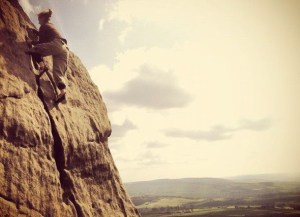Do you know the moment in Honnold 3.0 when Alex almost slips before clipping in? Just watching it, I could feel my blood run cold. And do you know how sometimes just before taking a fall your brain ‘forgets’ there is a rope or a pad to catch you? And later it can take a good couple of minutes to recover? Well, clearly Alex Honnold doesn’t get this feeling. Plus in his case there would be no rope to catch him.
I sometimes get scared on an indoor warm-up. Running up some ladder of a climb I realize three metres above the pads how painful it could be to fall. After all, I’ve seen people taken from the gym by ambulance – once it happened to me too – and this is not exactly a great thing to remember when not standing firmly on the ground. At such times I go down slowly, all tense, feeling as vulnerable as though I were soloing El Cap. And I know it’s not going to be a good session.
But there are other times too. Times when I’m trying some ridiculously difficult move (at least for me), completely absorbed by the challenge and not even taking into account the possibility of falling. After all, risks of bouldering don’t usually go beyond a sprained ankle. Still it can be really scary. Like in the picture featured in this post. After completing an easy climb (and it was not even as high as it looks) I refused to go down until my partner got up the rock and spent good fifteen minutes describing an easy descend route on the other side.
Such occurrences made me wonder how I’d react to the risks of leading multipitch trad in the mountains. After all, that’s what I always wanted to do… But what if I freeze motionless in the middle of some massive wall and refuse to go up or down?
To prepare, I made sure my first climbs were well within my technical abilities. And it turned out that the perfect stillness and sheer size of the mountains have a therapeutic effect. If something bad were to happen there among the granite peaks of Tatra Moutains, what would be the point of fighting it? It’s a kind of a peaceful surrender. A sensation that could not only make me a better sport climber but would make me enjoy life more. If only it could be evoked when needed.
Every now and then I come across an article in which a professional climber or a practitioner of some other dangerous sport talks about fear. And often it’s not about fear at all; it’s about risk calculation. This seems to be confirmed by various scientists claiming that people often called by the media ‘daredevils’ (or some equally silly names) are highly proficient in evaluating risks and, in fact, they don’t like to take chances at all.
Some are more spiritual about it. They claim it’s the selfless experience of being at one with the rock that allows them to go on. Steph Davis talks even of a sense of trust. Is it that people like her can find the peaceful surrender whenever they want? After all, these seemingly fearless individuals are quite often the ones who happily live outside of the constraints of mainstream society. It might well mean that their bravery is not limited to climbing only.
Over the course of the next weeks (months?) I will try talking to as many people as possible – sport psychologists, elite athletes, friends – asking them the same questions over and over again. How not to get scared? How to evaluate risks? How to control one’s emotions? Hopefully this little research will help me become just a little bit more fearless.

A great discussion topic and one which doesn’t get enough coverage in my opinion! Happy to contribute from the point of view of a clinical psychologist who works with climbers on their anxiety and people who have clinical levels of fear and anxiety
Thank you for your comment, I’m very glad you liked the topic. It would be amazing if you wanted to share some of your knowledge on this blog! Could I interview you maybe? Please let me know what would work for you best! 🙂